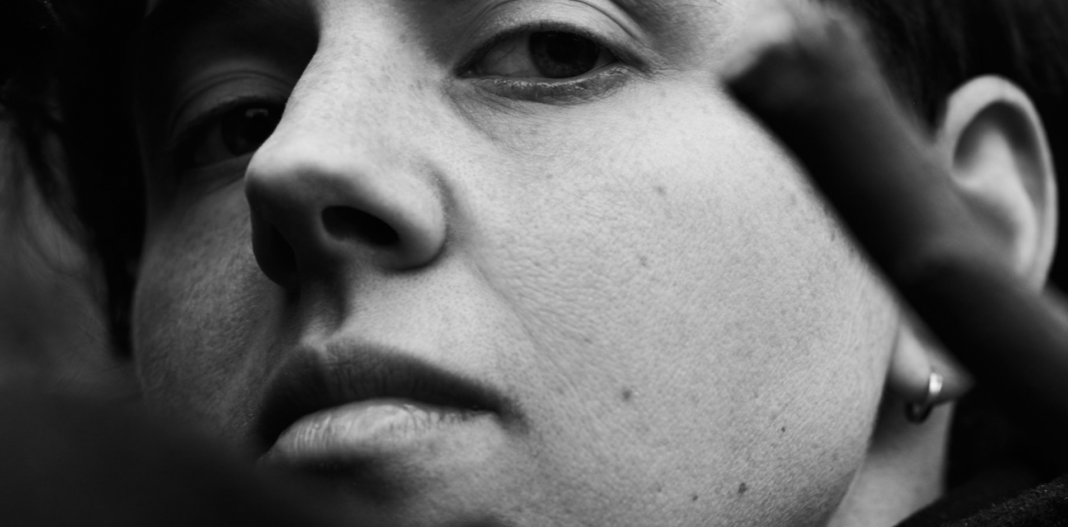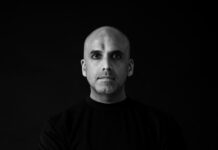Photo: Press (Borusiade)
Borusiade has been a vital part of Berlin’s club scene for so long, it’s no unlikely that most people don’t even know that Miruna Boruzescu started her career somewhere. The classically trained producer and DJ cut her teeth in the early noughties in her native Bucharest during the peak of the Electroclash hype which she has subsequently traced to its roots in Electro and the fringes of 80s music. Her own productions for Correspondant, Minimal Wave’s Cititrax sublabel and the Cologne-based Cómeme imprint for which she also hosts a regular radio show, are informed by weird Disco vibes, Industrial atmospheres and a harshness singular to New Beat and EBM – yet, they rarely sound nostalgic. Such is also the case with Borusiade’s contribution to our Groove podcast, a singular exercise in rhythmic magic.
You’ve received a classical training in music and sang in a choir before you started DJing and producing electronic music. What were the key experiences and/or records that got you into electronic music?
Yes indeed, I started with a classical music training and the day I wanted to express myself, the only available tools for the “orchestras” in my head were electronic. The piano I studied as a child didn’t give me that sort of satisfaction and after singing classically in a children choir for 12 years I rediscovered my voice a bit later in different shape. Around the beginning of 2000, there was a big electro revival also encompassing some sounds of the 80s and brought them all in the clubs – it was called generically electro-clash. I think that was the time I started finding “club music” appealing because suddenly I heard something melodical and ”baroque” – a dance music that wasn’t only the monotone 4/4 beats. Suddenly something in there was resonating with me. New sounds like Ladytron’s “604” and Fischerspooner’s “ #1” were perfectly clashing with Kraftwerk and Fad Gadget or Gary Numan, then I discovered other producers that blew my mind – Miss Kittin and The Hacker, the French scene around Le Pulp – Chloé, Jennifer Cardini, the Dutch electro scene around Bunker Records. I did enough name dropping here, I think…
You’ve left your native Romania a whole while ago but regularly still play there. How do you perceive the scene there now compared to when you started out?
Theoretically, I left Bucharest for Berlin about 10 years ago but I always lived between the two cities. I have my family and many good old friends there so I still go as often as I can. Also musically I like to identify myself with this Romanian underground scene and I try to support it as much as I can. The scene I am talking about is still very small but there are a few names and events that should be able to put it on a map of electronic music, here briefly just a few: Rokolectiv, Future Nuggets, Khidja, P-Balans, The Attic and last here but certainly not least and from a slightly different scene but with the same roots Cosmin TRG. When I started, everything was gravitating around this small 19th century house with a beautiful backyard terrace in Bucharest – The Web Club. It was the beginning of 2000. It was a place where almost everybody in this scene started. It is the place where I personally played music for the first time. The place closed some years ago and took away with it many stories. Then the Rokolectiv festival started, organised by friends from the same small crew around The Web. This was and is an event that gave a consistency to this audience who was looking for “something else”, especially since the organisers are always ahead of the obscure trends of electronics and innovative arts. Then other places started to open, some closed again but the line-ups started to differ and this scene started to grow slowly and fortunately also to diversify in terms of gender. When I started I was feeling quite alone as a girl behind the decks. Now there are a few young and bold girls who start to rock Bucharest too. In Bucharest we mostly all know each other, especially when we have the same interests, so the people in behind this scene are old friends, former school mates, university colleagues – all a big family. The scene grew in the past years and many new and talented faces started to appear, mostly young DJs with interest towards a different type of club music and not only. I, personally am waiting for more interesting producers from this scene, especially girls. But they need to still fight their way out in the light somehow and I am sure they will.
Despite having been part of two different group projects and even though you’ve been active in the scene for more than one and a half decades, you’ve only recently started releasing music as a solo producer. What took you so long?
Music was always part of my life and as you say, electronic music since more than 15 years. Even if my musical education started when I was six, playing and especially making my own music took the time it took. First I had to learn the tools and the language well enough to be able to express myself the way I wanted and only then I started to share my music further. Besides this, even if music was and is one of my main passions, it is not the only one. It shares its place with film – my academical degree is of a film director. So before I dared getting my music out of the house, I studied film direction and worked in that field for a while, always DJing and making progresses in putting out what was in my head. Then, after finally sharing out some music to the world, that side of the coin turned out to be “the real deal” – at least for now. So it took the time it took – and when I was ready somebody heard me and I showed up.
In addition to your solo releases, you’ve also remixed a lot of music, like most recently a track from Lena Platonos’s Sun Masks album, that had been reissued via Dark Entries. What constitutes a good remix for you and how did you approach this undeniably special project?
The remixes I liked most usually changed the approach on the original track quite radically but without killing its essence. I was never a fan of remixes that sound as edits of the original track, with not much creative input or vision from the remixer. A remix is a production in itself – this is why I think the word “remix”, taken literally doesn’t really describe these new approaches on tracks. That’s why I would rather call them “versions”. It is like producing but on a given theme and I always liked this challenge. For the Lena Platonos Remix, first of all I was very honoured to be invited to take a go on such a precious material and of course to then release it on one of my favourite labels – Dark Entries in such great company. About the production I will start by saying that there were no stems for the album so basically the whole work had to be done on the original track with only the help of frequencies so I decided to build a whole different atmosphere around the original track, adding up sounds that still communicated with the original ones and melted together. I also checked out for a translation of the original Greek lyrics in English and that confirmed me I was in the right vibe. One of the first feedbacks I got to this remix was from a friend listening who said: “It sounds like Lena Platonos is riding a submarine:”
You host a regular radio show, The Dreamcatcher, on Cómeme. The shows usually have a loose theme. How do you usually pack your bag for those shows?
I once called The Dreamcatcher “my musical playground” and with that I describe the way I feel about this one-hour journey that I make once a month on Radio Cómeme. I love music in its complexity and I listen to everything that moves me, no matter the genre. And then since I am very bound to film, I visualise a lot when I hear music and of course the other way around -I often imagine the kind of music that fits to a moving image. This is why The Dreamcatcher series are like sonic films to me: every episode is built around a vibe, dream, state of mind, feeling, happening or simply a cutout of life that I experienced that month or day/night. It is almost like a glimpse of a diary and the sonic sources for the material are very diverse. At the same time, this is the way I function when I make a mix or podcast too but in my radio show I feel even more “at home” as I know there are no specific expectations but probably just curiosity.
Without peaking at the tracklist, it would be difficult to identify when the tracks on your contribution to our Groove podcast were released. What was your idea behind it?
There was more a vibe than an idea behind the mix I did for Groove. I selected the tracks while visiting Bucharest and I must say this place gets close to tropical in summer so the decisions people are making are much filtered by the climate. I noticed a funny thing in me picking out tracks unconsciously, slightly sound-related to the 90’s and this is new but I suspect a wave of nostalgia, even though at that time I was not listening to dance music and/or going out to dance at raves. I was too young and there weren’t any in Romania. But with a special cable you could watch MTV… So the answer to your question is briefly: I don’t know.
When interviewing Gudrun Gut for Expatriarch, you asked her: “How do you manage to keep a fresh vision on music? To be a person of the times?” – What would your own answer to that question be?
Always be your sharpest, most honest critic but also learn to listen. Never compromise. Do your thing with honesty and as long as you have something to say, say it. When you feel you don’t have anything to say anymore, then retire somewhere and start gardening. And I mean it.
Last but not least: Where can we see you behind the decks or performing live – and what are your plans as a producer?
Well I have quite a few confirmed dates already and I can mention a few , I’ll play a set on the Red Light Radio stage at the Dekmantel Festival in Amsterdam, this Saturday, Berghain Säule next weekend and then Bucharest in great company together with Veronica Vasicka and Cosmin TRG. Later on London, Waiting Room, Paris at the queer party Wet For Me and also in September I will be playing for the first time in Canada, in Montreal. Production-wise my main focus is now on my first album that will be released in 2018 on Cómeme. Preceding the album will be a single that will be released this year containing a remix from my brothers Khidja.
Stream: Borusiade – Groove Podcast 118
01. Nik Pascal – Edge Of The Unknown
02. Muzikalist – The Night Drive To The Sea
03. Survive – Cutthroat (Lena Willikens Remix)
04. Bill Converse – Thank You
05. Lhidja – Microb (Tolouse Low Trax Version 117)
06. Mekine U Teksi – Weltschmerz
07. Crystal Maze – Outburst
08. Savage Hymn – Animals V2
09. Cop Envy – Head Mark
10. Stratowerx & Mark Walsh – No Function (Scott Fraser Surface Pressure Mix)
11. Die Form – Feel The Night
12. Andrew Weatherall – Kaif
13. Simon Haydo – Moxie
14. Oim – Ricosivita





